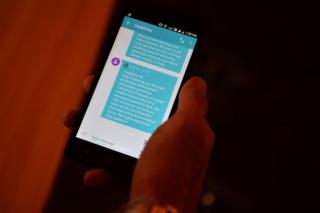 Image copyright
Image copyright
Abid Bhat
The social media ban came after a series of clashes between civilians and security forces
Authorities in Indian-administered Kashmir have announced a one-month ban on 22 social media services, including Facebook, Twitter and WhatsApp. The state government said the services were being misused by “anti-government elements” to incite violence. Gowhar Geelani reports on life without social media in the valley.
Srinagar-based photojournalist Javed Dar says that the ban on social media has left him “disconnected from people” and has also hampered his work.
Mr Dar says he had to invite friends and colleagues to a book release event, but didn’t have contact numbers for all.
“Normally, I would have invited many through Facebook and Twitter. The ban on social media has made this impossible,” he said.
Other social media services, communications tools and websites banned under the order include YouTube, Skype, Telegram, Snapchat and Reddit. Also, the faster 3G and 4G mobile phone services have been slower and erratic for more than a week.
Dr Qazi Haroon, a government doctor, says many health awareness campaigns which his department was running on social media have taken a hit.
“Now we have no other medium to promote awareness programmes related to immunisation, mother and child care, neonatal care,” he told the BBC.
Image copyright
Abid Bhat
More than 22 social media services have been banned
Image copyright
Abid Bhat
The internet has been blocked in Kashmir at least 31 times between 2012 to 2016
The internet is often suspended or restricted in Kashmir to quell civilian protests and anti-India demonstrations, which sometimes turn violent.
According to a report by the Software Freedom Law Centre, the internet has been blocked in Kashmir at least 31 times between 2012 to 2016.
However, this is for the first time that the authorities have placed a complete ban on social networking sites.
‘Subversive elements’
Advocacy groups like India’s Centre for Internet and Society have described the ban a “blow to freedom of speech” and “legally unprecedented in India”.
And the New York-based Committee to Protect Journalists (CPJ) has asked India to revoke the ban.
“The sweeping censorship of social media under the pretext of ‘maintaining peace and order’ will bring neither peace nor order,” media reports quoting Steven Butler of CPJ said.
The state government order said social media networking sites were being used by “anti-national and subversive elements” to harm peace in the state.
It said “objectionable content” was being distributed to “spread disaffection” with the authorities.
Image copyright
Abid Bhat
The authorities say the ban is to prevent people inciting violence or spreading rumours
Image copyright
Abid Bhat
The ban made it to the front pages of local newspapers
The latest bout of violence began on 9 April when eight people were killed and scores injured after police clashed with protesters during a by-election in the city of Srinagar.
Since then, hundreds of students have protested on the streets, chanting anti-India slogans and throwing stones at the security forces.
Graphic videos claiming to show abuses on both sides have been shared extensively on social media and have added fuel to the conflict.
- Is India losing Kashmir?
- The ‘studious’ 12-year-old victim of India’s Kashmir problem
- The election where no-one came to vote
Opposition and pro-independence groups have criticised the government’s move.
“Repeated bans on means of communication in this day and age in the hope of restoring so-called peace and normalcy in the Kashmir Valley is ridiculous,” Mirwaiz Umar Farooq, one of the most influential leaders in the Kashmiri separatist movement, said.
Terming the ban “archaic”, the main opposition National Conference party accused the government of meting out “collective punishment to the people of Kashmir for expressing their political aspiration and raising voice against gross human rights excesses”.
Justifying the internet gag, a government representative said that the move was aimed at restoring normalcy and stopping rumours from spreading further.
“It [the ban] is a temporary decision to stop rumours and restore law and order to prevent further loss of life. Also, it is being done to prevent a war of provocative videos from both sides,” Waheed Ur Rehman Parra, leader of the ruling party’s youth wing, told the BBC.
India: Kashmir social media ban criticised}

